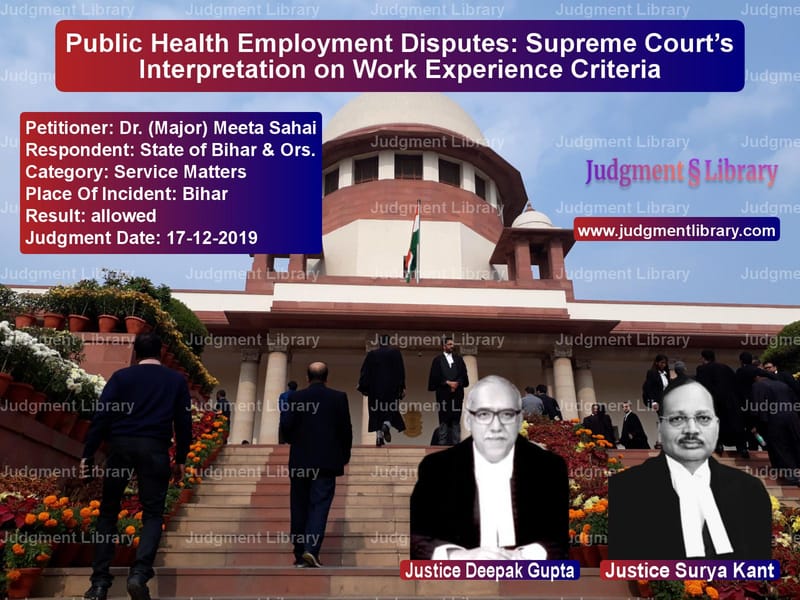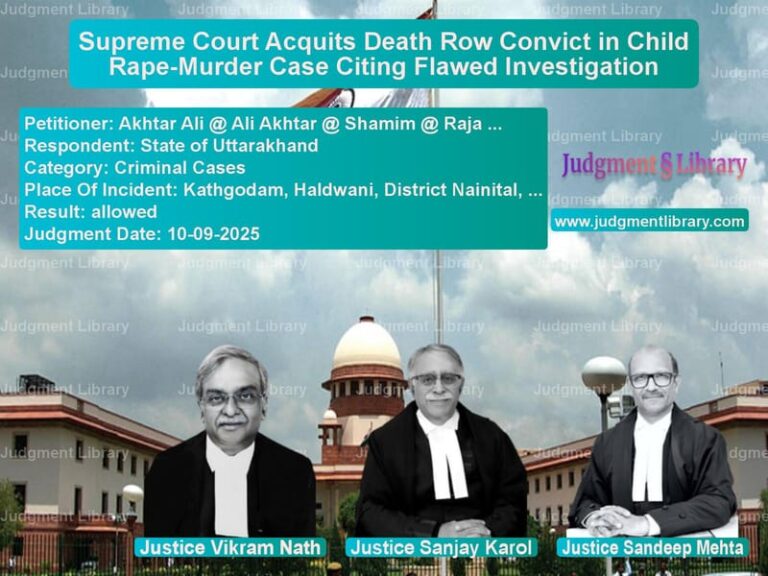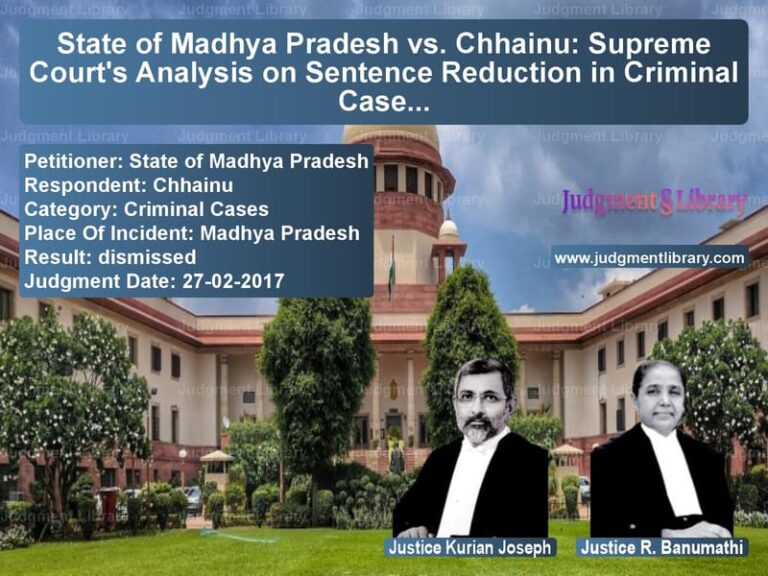Public Health Employment Disputes: Supreme Court’s Interpretation on Work Experience Criteria
The case of Dr. (Major) Meeta Sahai vs. State of Bihar & Ors. addresses a crucial issue related to employment opportunities for medical professionals in government hospitals. The petitioner, Dr. Meeta Sahai, had applied for the post of General Medical Officer in the state of Bihar, a post which was advertised by the Bihar Public Service Commission in 2014. The controversy arose when her work experience in a non-Bihar government hospital was excluded from the merit list, as per the specific criteria set in the advertisement. The Supreme Court had to resolve whether the restriction imposed by the State, limiting eligibility for work experience marks to only those serving in hospitals under the Bihar Government, was lawful and consistent with the rules.
Background of the Case
The Bihar Public Service Commission (BPSC) issued an advertisement on July 18, 2014, for the recruitment of 2301 General Medical Officers in the state. According to the advertisement, applicants would be evaluated based on academic qualifications, work experience, and interview performance. A total of 100 marks were allocated, with 50 marks for MBBS qualifications, 10 marks for higher degrees, 25 marks for work experience, and 15 marks for the interview.
Dr. Sahai, who had worked as a medical officer in the Army Medical Corps and other non-Bihar government hospitals, applied for the post, hoping to leverage her experience in these establishments. However, when she appeared for the interview, she was informed that her work experience in non-Bihar government hospitals would not be counted for work experience marks, as the advertisement specified that only work in hospitals run by the Bihar Government would be considered.
Despite her qualifications, Dr. Sahai’s final score was insufficient to make it to the merit list due to this exclusion, and she was consequently not selected for the position. She filed a writ petition before the Patna High Court, challenging the clause in the advertisement that restricted work experience to only Bihar government-run hospitals.
Key Legal Issues
The Supreme Court had to address the following legal issues:
- Whether the restriction placed on work experience, limiting eligibility to work in Bihar government hospitals, was legally valid under the Bihar Health Service (Appointment and Service Conditions) Rules, 2013.
- Whether the interpretation of the term “Government hospital” in the rules should be limited to Bihar government hospitals or include all government hospitals in India, particularly those run by the Central Government and other public authorities.
- Whether the Patna High Court erred in dismissing the petitioner’s challenge based on the existing rules.
Arguments by the Petitioner (Dr. Meeta Sahai)
Dr. Sahai’s counsel, Mr. Pradeep Kumar, presented the following arguments:
- The definition of “Government hospital” was ambiguous and should not have been restricted to only Bihar Government hospitals. The appellant argued that the term “Government hospital” should be understood in its broader sense, including those hospitals run by the Central Government, Municipalities, Panchayati Raj Institutions, and other public entities.
- Dr. Sahai’s work experience in the Army Medical Corps should be considered valid, as it was equivalent to experience gained in a government hospital, especially in terms of the public service aspect and dealing with the public health challenges.
- The exclusion of non-Bihar government hospital experience was arbitrary and discriminatory, as it failed to recognize the diversity of work done in government-run hospitals across the country, all of which provide vital public health services.
- The restriction on work experience was in violation of the constitutional principle of equal opportunity under Article 16, as it unfairly penalized candidates like Dr. Sahai, who had served in public hospitals outside Bihar.
Arguments by the Respondents (State of Bihar and BPSC)
The respondents, represented by Mr. R. N. Sharma, argued the following points:
- The advertisement was clear in its criteria that work experience in hospitals run specifically by the Bihar Government would be considered for awarding marks. This limitation was in accordance with Rule 6(iii) of the Bihar Health Service Rules, 2013, which explicitly stated that only such experience would count.
- Work experience gained in other hospitals, including those run by the Central Government or other states, could not be equated with experience in Bihar government hospitals due to the unique infrastructural challenges and patient care responsibilities in Bihar’s public hospitals.
- The principle behind the restriction was to prioritize candidates who had served in Bihar, given the state’s unique healthcare challenges, and to ensure that doctors recruited in Bihar had experience in handling local public health issues.
- The appellant’s reliance on the definition of “Government hospital” from the Bihar Dentist Service Rules was misplaced, as those rules specifically applied to dentists, not medical officers in general duty.
Supreme Court’s Observations and Ruling
The Supreme Court bench, comprising Justice Deepak Gupta and Justice Surya Kant, delivered the following key observations:
1. Interpretation of “Government Hospital”
The Court began by examining the term “Government hospital” and observed:
“The term ‘Government hospital’ must be interpreted in the context of public health and medical services. To limit it to hospitals run only by the Bihar Government excludes a large number of hospitals that are also government-funded and provide essential services to the people of Bihar.”
2. The Role of Central and Other Public Hospitals
The Court recognized that hospitals run by the Central Government and other public authorities also play a crucial role in the healthcare system, particularly in states like Bihar, where the public health system faces immense challenges:
“Hospitals run by the Central Government, the Armed Forces, and other public institutions serve the public in a manner equivalent to state-run hospitals. Limiting work experience to only Bihar Government hospitals creates an unnecessary division that undermines the value of medical service across the country.”
3. Discrimination and Equal Opportunity
The Court emphasized the constitutional principle of equal opportunity in public employment and stated:
“Equal treatment of candidates requires that all candidates with relevant experience in public hospitals, irrespective of whether they are in Bihar or elsewhere, should be given equal consideration for work experience marks.”
4. The Arbitrary Restriction
The Court concluded that the restriction was arbitrary and unfairly limited opportunities for candidates with valuable experience in other government-run hospitals:
“The restriction of work experience to only Bihar Government hospitals is arbitrary and does not further the objective of recruiting the best-qualified candidates for the role. Such a restriction should not be upheld.”
Final Judgment
“Rework the merit list to include the appellant’s work experience in the Army Medical Corps and any other non-Bihar Government hospitals. The appellant should be granted due weightage for her work experience as per the criteria of the Bihar Health Service Rules.”
Implications of the Judgment
This ruling has significant implications for public employment policies in Bihar:
- Broad Interpretation of Work Experience: The judgment expands the scope of eligible work experience for candidates applying to government jobs in Bihar, ensuring that experience from non-Bihar government hospitals is also recognized.
- Equal Opportunity in Public Employment: The Court reinforced the importance of providing equal opportunities to all candidates, irrespective of where their work experience was gained, as long as it was in a public healthcare setting.
- Constitutional Values in Recruitment: The judgment underscores the constitutional requirement to treat candidates equally, thereby ensuring that restrictive provisions do not undermine the principles of fairness and justice in recruitment processes.
Conclusion
The Supreme Court’s ruling in Dr. (Major) Meeta Sahai vs. State of Bihar reinforces the principles of equal opportunity and fairness in public recruitment, particularly in the healthcare sector. By expanding the definition of “Government hospital” to include non-Bihar government institutions, the Court ensures that highly qualified candidates, regardless of their previous assignments, are not unfairly excluded from consideration in the recruitment process.
Petitioner Name: Dr. (Major) Meeta Sahai.Respondent Name: State of Bihar & Ors..Judgment By: Justice Deepak Gupta, Justice Surya Kant.Place Of Incident: Bihar.Judgment Date: 17-12-2019.
Don’t miss out on the full details! Download the complete judgment in PDF format below and gain valuable insights instantly!
Download Judgment: Dr. (Major) Meeta Sa vs State of Bihar & Ors Supreme Court of India Judgment Dated 17-12-2019.pdf
Direct Downlaod Judgment: Direct downlaod this Judgment
See all petitions in Employment Disputes
See all petitions in Promotion Cases
See all petitions in Workplace Harassment
See all petitions in Judgment by Deepak Gupta
See all petitions in Judgment by Surya Kant
See all petitions in allowed
See all petitions in supreme court of India judgments December 2019
See all petitions in 2019 judgments
See all posts in Service Matters Category
See all allowed petitions in Service Matters Category
See all Dismissed petitions in Service Matters Category
See all partially allowed petitions in Service Matters Category







